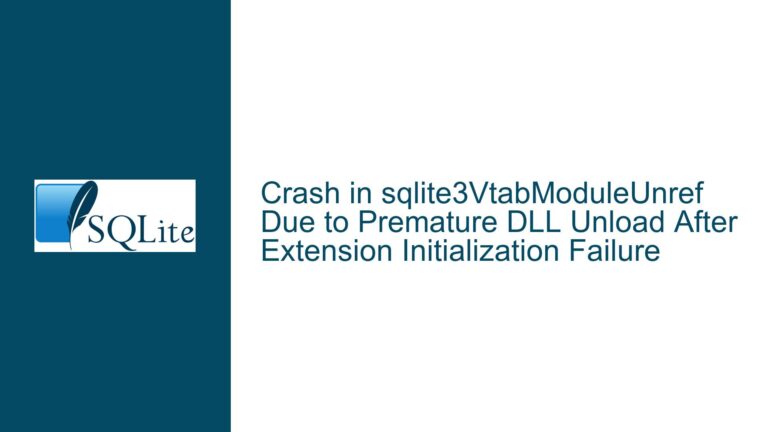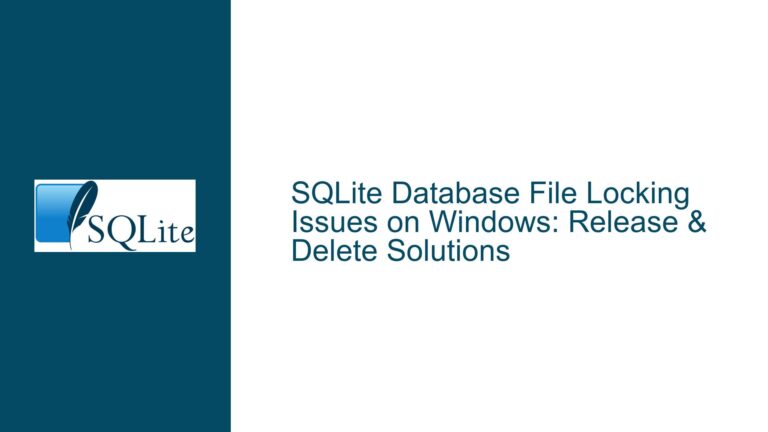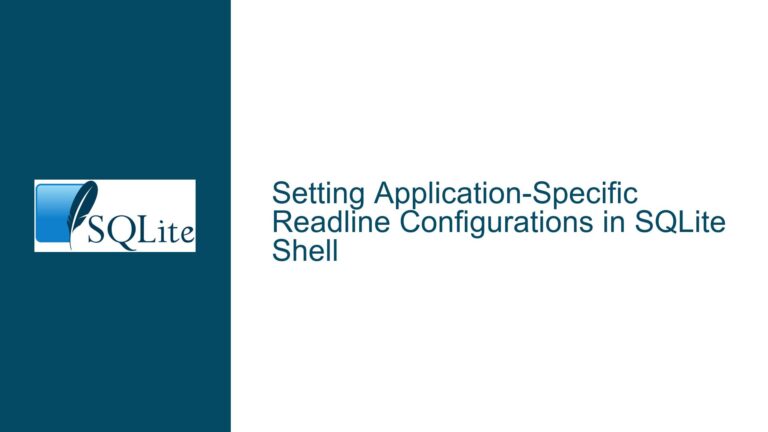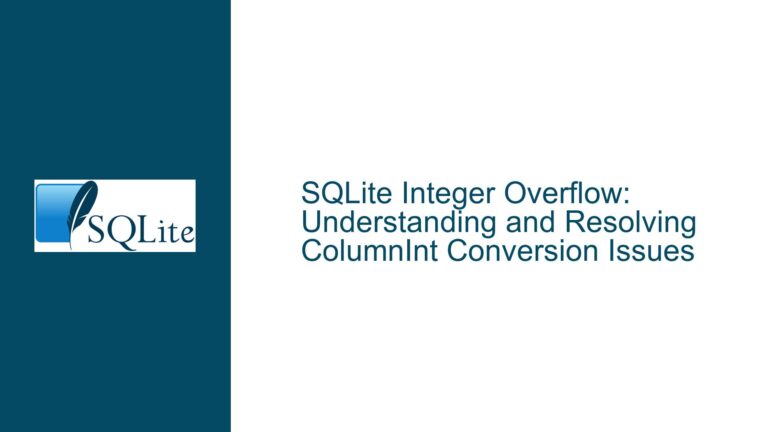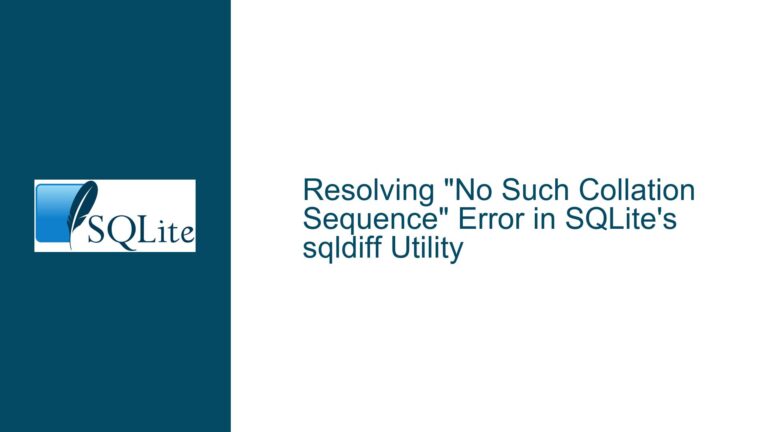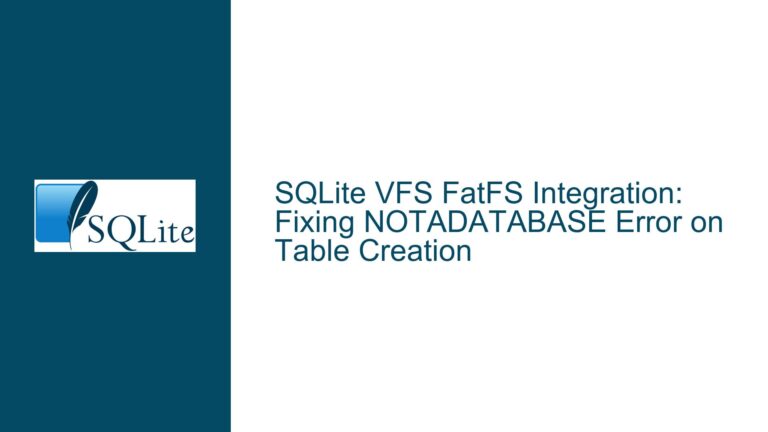Undefined Symbols in SQLite Loadable Extension on Apple Silicon
Issue Overview: Undefined Symbols in SQLite Loadable Extension on Apple Silicon
When attempting to build a loadable extension for SQLite on an Apple Silicon machine (specifically an M3 MacBook Pro with an arm64 architecture), the compilation process fails with an error indicating undefined symbols. The error message specifically points to the symbol _sqlite3_create_module, which is referenced in the extension’s source code but cannot be found during the linking phase. This issue is compounded by a warning about excess elements in a struct initializer, which hints at a potential mismatch between the version of SQLite being used and the version expected by the extension’s source code.
The core of the problem lies in the fact that the extension is being compiled against a version of SQLite that does not include certain symbols or methods expected by the source code. This is further evidenced by the warning about the xIntegrity method, which was introduced in SQLite version 3.44.0. If the version of SQLite being used is older than 3.44.0, the xIntegrity method will not be available, leading to the warning and potentially causing the undefined symbols error.
Possible Causes: Version Mismatch and Architecture-Specific Issues
The primary cause of the undefined symbols error is a version mismatch between the SQLite library being linked against and the version expected by the extension’s source code. The xIntegrity method, which is part of the sqlite3_module structure, was introduced in SQLite version 3.44.0. If the version of SQLite being used is older than this, the method will not be available, leading to the warning about excess elements in the struct initializer and the subsequent undefined symbols error.
Another potential cause is related to the architecture-specific compilation flags. The -arch arm64 flag is used to specify that the extension should be compiled for the arm64 architecture, which is correct for an Apple Silicon machine. However, if the SQLite library being linked against is not compiled for the same architecture, or if there are issues with the library paths or environment variables, the linker may not be able to find the required symbols.
Additionally, the use of the -dynamiclib flag indicates that the extension is being compiled as a dynamic library. This requires that the SQLite library be available as a shared library (.dylib on macOS) rather than a static library (.a). If the SQLite library is only available as a static library, or if the paths to the shared library are not correctly specified, the linker will fail to find the required symbols.
Troubleshooting Steps, Solutions & Fixes: Resolving Version Mismatch and Ensuring Correct Architecture
To resolve the undefined symbols error and successfully build the loadable extension for SQLite on an Apple Silicon machine, the following steps should be taken:
1. Verify the Version of SQLite:
The first step is to verify the version of SQLite being used. This can be done by running the following command in the terminal:
sqlite3 --version
This will output the version of SQLite installed on the system. If the version is older than 3.44.0, the xIntegrity method will not be available, and the extension will not compile successfully. In this case, the SQLite library should be updated to at least version 3.44.0.
2. Update SQLite to the Required Version:
If the installed version of SQLite is older than 3.44.0, it should be updated. This can be done by downloading the latest version of SQLite from the official website (https://www.sqlite.org/download.html) and compiling it from source. Alternatively, if using a package manager like Homebrew, the following command can be used to update SQLite:
brew upgrade sqlite
After updating SQLite, the version should be verified again to ensure that the update was successful.
3. Ensure Correct Architecture:
The extension is being compiled for the arm64 architecture, which is correct for an Apple Silicon machine. However, it is important to ensure that the SQLite library being linked against is also compiled for the same architecture. This can be verified by running the following command:
file /path/to/sqlite3
This will output information about the architecture of the SQLite library. If the library is not compiled for arm64, it should be recompiled with the correct architecture flags.
4. Specify the Correct Library Paths:
When compiling the extension, it is important to specify the correct paths to the SQLite library and headers. This can be done using the -I flag for the include path and the -L flag for the library path. For example:
gcc -g -fPIC -arch arm64 -dynamiclib -I/path/to/sqlite/include -L/path/to/sqlite/lib ./src/csv.c -o csv.dylib -lsqlite3
This ensures that the compiler and linker can find the required headers and libraries.
5. Use the Correct Compiler Flags:
The -dynamiclib flag is used to compile the extension as a dynamic library, which is correct for macOS. However, it is important to ensure that the SQLite library is available as a shared library (.dylib). If the SQLite library is only available as a static library (.a), it should be recompiled as a shared library. This can be done by adding the --enable-shared flag when configuring the SQLite source code before compilation.
6. Check for Environment Variables:
Environment variables such as DYLD_LIBRARY_PATH and LD_LIBRARY_PATH can affect the linker’s ability to find the required libraries. These variables should be checked to ensure that they include the paths to the SQLite library. For example:
export DYLD_LIBRARY_PATH=/path/to/sqlite/lib:$DYLD_LIBRARY_PATH
This ensures that the linker can find the SQLite library at runtime.
7. Recompile the Extension:
After ensuring that the correct version of SQLite is installed, the correct architecture is being used, and the correct library paths are specified, the extension should be recompiled. The following command can be used:
gcc -g -fPIC -arch arm64 -dynamiclib -I/path/to/sqlite/include -L/path/to/sqlite/lib ./src/csv.c -o csv.dylib -lsqlite3
If all steps have been followed correctly, the extension should compile successfully without any undefined symbols errors.
8. Test the Extension:
After successfully compiling the extension, it should be tested to ensure that it works as expected. This can be done by loading the extension into SQLite and running a query that uses the extension. For example:
sqlite3
.load ./csv.dylib
If the extension loads successfully and the query runs without errors, the extension has been successfully built and is ready for use.
9. Debugging Further Issues:
If the extension still fails to compile or load, further debugging may be required. This can include checking the SQLite error messages, using tools like nm to inspect the symbols in the compiled extension, and ensuring that all dependencies are correctly installed and linked. Additionally, reviewing the SQLite documentation and seeking help from the SQLite community may provide further insights into resolving the issue.
By following these steps, the issue of undefined symbols in the SQLite loadable extension on Apple Silicon can be resolved, allowing the extension to be successfully built and used.
